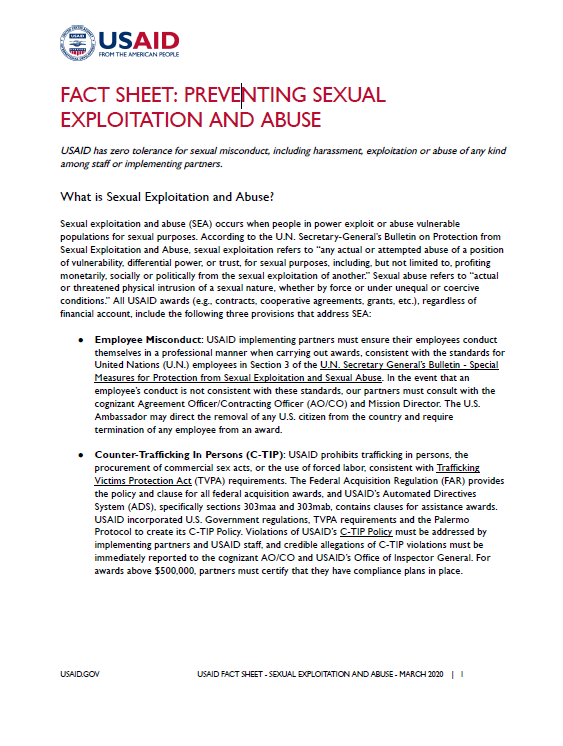- Work With USAID
- How to Work with USAID
- Organizations That Work With USAID
- Find a Funding Opportunity
- Resources for Partners
- Preventing Sexual Misconduct
- USAID Partners
- Acquisition & Assistance Ombudsman
- Acquisition & Assistance Policy Directives
- Development Information Solution (DIS)
- Indirect Cost Rate Guide for Non-Profit Organizations
- Procurement Executive Bulletins (PEBs)
- Progress Report - Fiscal Report 2019
- Implementing Partner Notices Portals
- Partner Vetting System
- Branding
- COVID-19 Guidance For Implementing Partners
- Preparing for a World Altered by COVID-19
- Section 889 Partner Information
- Careers
- Get Involved
Speeches Shim
USAID has zero tolerance for sexual misconduct, including harassment, exploitation or abuse of any kind among staff or implementing partners.
What is Sexual Exploitation and Abuse?
Fact Sheet: Preventing Sexual Exploitation and Abuse ![]() (pdf - 157k)
(pdf - 157k)
Sexual exploitation and abuse (SEA) occurs when people in power exploit or abuse vulnerable populations for sexual purposes. According to the U.N. Secretary-General’s Bulletin on Protection from Sexual Exploitation and Abuse, sexual exploitation refers to “any actual or attempted abuse of a position of vulnerability, differential power, or trust, for sexual purposes, including, but not limited to, profiting monetarily, socially or politically from the sexual exploitation of another.” Sexual abuse refers to “actual or threatened physical intrusion of a sexual nature, whether by force or under unequal or coercive conditions.” All USAID awards (e.g., contracts, cooperative agreements, grants, etc.), regardless of financial account, include the following three provisions that address SEA:
- Employee Misconduct : USAID implementing partners must ensure their employees conduct themselves in a professional manner when carrying out awards, consistent with the standards for United Nations (U.N.) employees in Section 3 of the U.N. Secretary General’s Bulletin - Special Measures for Protection from Sexual Exploitation and Sexual Abuse . In the event that an employee’s conduct is not consistent with these standards, our partners must consult with the cognizant Agreement Officer/Contracting Officer (AO/CO) and Mission Director. The U.S. Ambassador may direct the removal of any U.S. citizen from the country and require termination of any employee from an award.
- Counter-Trafficking In Persons (C-TIP) : USAID prohibits trafficking in persons, the procurement of commercial sex acts, or the use of forced labor, consistent with Trafficking Victims Protection Act (TVPA) requirements. The Federal Acquisition Regulation (FAR) provides the policy and clause for all federal acquisition awards, and USAID’s Automated Directives System (ADS), specifically sections 303maa and 303mab, contains clauses for assistance awards. USAID incorporated U.S. Government regulations, TVPA requirements and the Palermo Protocol to create its C-TIP Policy. Violations of USAID’s C-TIP Policy must be addressed by implementing partners and USAID staff, and credible allegations of C-TIP violations must be immediately reported to the cognizant AO/CO and USAID’s Office of Inspector General. For awards above $500,000, partners must certify that they have compliance plans in place.
- Child Abuse, Exploitation Or Neglect : As a condition of receiving funding, Child Safeguarding Standards , included in all USAID awards other than contracts for commercial items, require recipients to abide by core principles that prohibit personnel from engaging in child abuse, exploitation or neglect; incorporate child safeguarding in project planning and implementation; and institute procedures to prevent and address violations. These protections stem from the U.S. Government Action Plan on Children in Adversity and the Assistance for Orphans and Other Vulnerable Children Act of 2005 .
In addition, awards that involve International Disaster Assistance (IDA), Transition Initiative (TI), and Food for Peace Title II (Title II) funds must also adopt the following:
- Code of Conduct in Humanitarian Relief Operations : In advance of receiving funding, partners with awards involving the above-mentioned accounts must adopt a code of conduct to protect beneficiaries from sexual exploitation and abuse in humanitarian relief operations consistent with the six core principles adopted by the U.N. Inter-Agency Standing Committee on Protection from Sexual Exploitation and Abuse in Humanitarian Crises . Partners who receive IDA funds from USAID’s Office of U.S. Foreign Disaster Assistance are also required to provide details on how the code of conduct will be implemented within a specific field project.
USAID is exploring the possibility of revising its future award requirements related to acquisition and assistance awards, consistent with applicable U.S. law and regulations, to provide additional protections against SEA, including by strengthening reporting requirements, addressing the needs of survivors, and requiring appropriate accountability for perpetrators in accordance with due process. USAID is also working with other donors and public international organizations to encourage multilateral organizations and their implementers to take appropriate steps to prevent and address incidents of SEA under donor-supported activities. USAID anticipates engaging with the implementing partner community on any proposed changes to award requirements.
How Do I Report SEA?
Implementing partners should consult their award requirements (and the list above) to determine how best to report SEA allegations. USAID encourages implementing partners to report credible allegations of sexual exploitation and abuse to the USAID Office of Inspector General (OIG), as well as to closely consult with the cognizant AO/CO and Mission Director. Complaints can be submitted anonymously to the OIG with an online form through the OIG General Hotline website ( https://oig.usaid.gov ), by telephone at 1-800-230-6539 or +1 202-712-1023, by email at ig.hotline@usaid.gov , by fax at +1 216-3801, or by mail to the following address: U.S. Agency for International Development, Office of Inspector General, P.O. Box 657, Washington, DC 20044-0657. Once USAID receives a report, it may direct partners to take specific steps to address an actual or alleged violation and to ensure that survivors are protected, and may impose special conditions as part of its awards or take other remedial actions. The USAID OIG may also investigate and take action. The OIGl may also investigate and refer an investigation for consideration of criminal, civil, and/or administrative remedies.


Comment
Make a general inquiry or suggest an improvement.